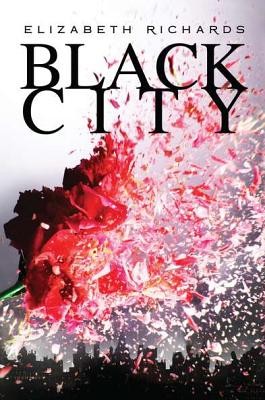Title: Black City
Author: Elizabeth Richards
Release Date: Available
When I picked up Black City, I knew that there was a good chance it was going to be a bandwagon-jumper, but I held on to a hope that, even though vampires and dystopia are clearly getting to be overdone, it would have some unique or outstanding quality to add to the bandwagon. Unfortunately, I found that several scenes reminded me of other popular series out there and the world-building that’s gotten high praise from other reviewers was mimicking history with a supernatural twist.
The book follows Natalie and Ash, the daughter of the Emissary in their crumbling nation and a half-Darkling “twin-blood” boy. Though they can’t stand each other at first due to their conflicting backgrounds, they soon realize they’re Blood Mates when Ash’s dormant Darkling heart starts beating. The book alternates between Natalie and Ash’s perspectives as they uncover the secrets of the corrupt government, fight for an end to a deadly drug craze, and struggle to hide their forbidden love. The scenario obviously has potential, but the writing held it back.
From start to finish, I felt disengaged from the characters; I constantly had to check from whose perspective I was reading because the characters were underdeveloped and melded together. They lacked the three-dimensional complexity that engages me, which made me apathetic toward their fate. I also felt that the relationship (which was indubitably the dreaded “instalove”) and other emotional events happened too quickly, with no foreshadowing before or processing after something supposedly intense or shocking happened. Hopefully Richardson, who, granted, is a debut author, will nail down the fundamental “show don’t tell” rule in her sequels.
The setting and world-building have received some high praise from reviewers, but I noticed that it was strikingly similar to the Holocaust and WWII. There were ghettos, migration camps, concentration camps, a Doctor Mengele-esque character, a Nazi-esque group, and a dictator who used the Darklings as a scapegoat for the nation’s problems. And though it was creepy at times, I thought it lacked the relentless horrors of a war book. It was also heavily inspired by other series, even if just in small scenes. For example:
Gregory stretches out a hand toward Natalie.
‘I’m Gregory Thompson,’ he says. ‘My father works for the Department of Subspecies Management, sorts out the Synth-O-Blood shipments to the Legion, that sort of thing. Maybe you’ve heard of him?’
Natalie smiles politely. ‘The name doesn’t ring a bell.’
He looks disappointed. ‘Well, it’s an honor to have you here. I’ll happily show you around the school—’
‘Day’s doing that, but thanks,’ she says dismissively.
‘You don’t want to be seen with her sort, she’s one of the Rise kids,’ he says to Natalie. ‘I’ll set you up with the right type of people to know.’
Day’s cheeks turn red.
‘I can make my own mind up about who the ‘right type of people’ are,’ Natalie snaps. ‘I’m already getting a pretty good idea of who I want to avoid’ (57).
Furthermore, there are several scenes that are likewise “heavily inspired” by Twilight and New Moon, as well as a President Snow of The Hunger Games. Sometimes these snippets are inconsequential to the plot, but they nonetheless occur too often for my taste.
There is certainly an audience for Black City; it was designed to appeal to Hunger Games and Twilight fans. Some will find it quick, readable, and entertaining. Even I like something a little fluffy every once and a while. Yet, while the book had a lot of potential to add something unique to the vampire/dystopia collection, the ideas were too underdeveloped and unoriginal to really grasp me personally. 2/5 stars.
Review by Casey
Order Black City from Book Passage
